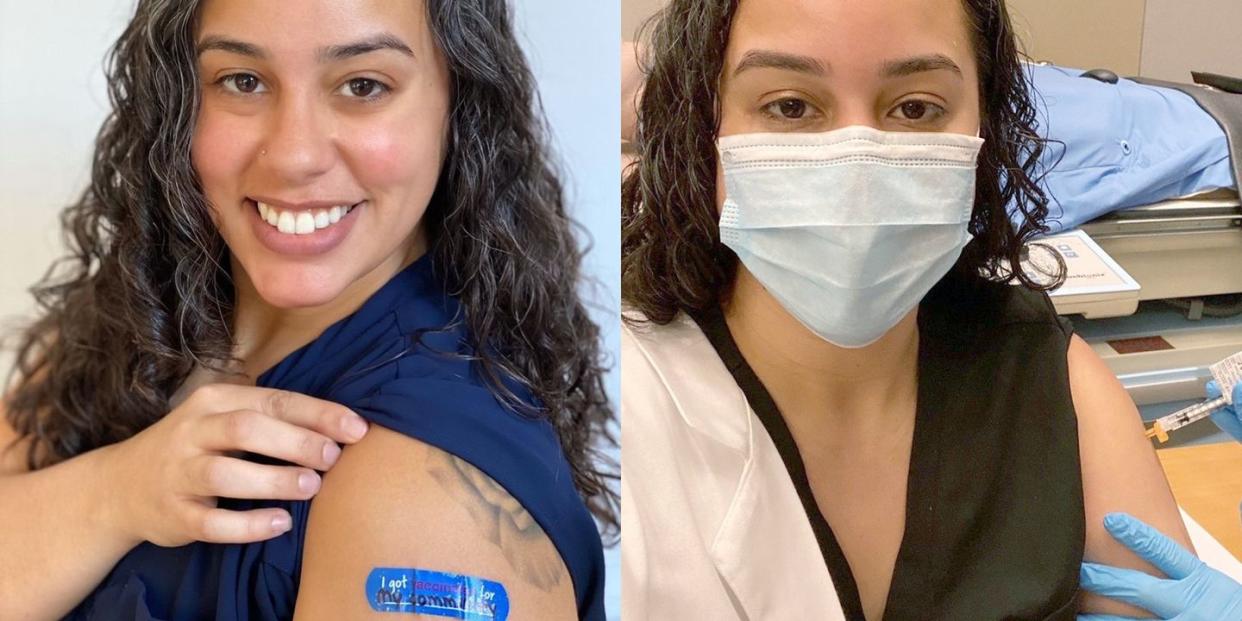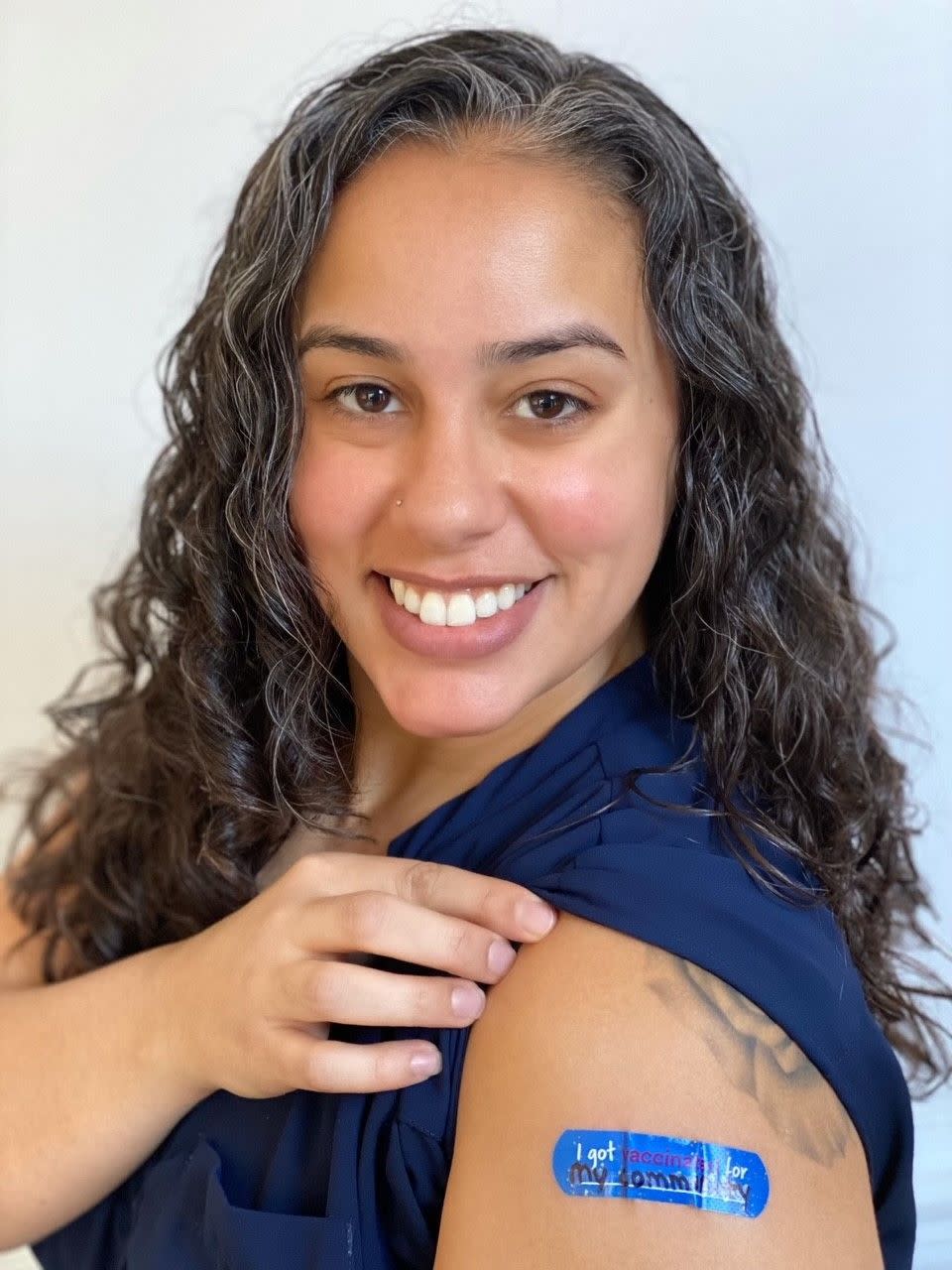How You Can Expect to Feel After the COVID-19 Vaccine

Fever. Chills. Headaches. Tiredness. Nausea.
Family physician Alexa Mieses Malchuk, MD, had been informed that these were potential side effects of the COVID-19 vaccine, and that they were more common after the second dose. One of Mieses Malchuk’s colleagues at the UNC Family Medicine Center in Durham felt so sick after her second shot that she needed to take a day off from work. Another had fatigue and body aches for 24 hours, while a prominent physician Mieses Malchuk follows on Twitter said that shot number two made her feel like she was “dying.”
So even though Mieses Malchuk hadn’t experienced any problems after her initial dose of the Pfizer vaccine (read what that was like here), she anticipated that the second shot—which she received 21 days later—would take her down. “I was preparing myself to feel like I had the flu,” she says.
Contrary to what some might believe, the COVID-19 vaccine will not cause you to get sick from the coronavirus. The type of vaccine currently offered by Pfizer and Moderna do not contain the virus in any form—live, dead, or weakened. Instead, these mRNA vaccines use an advanced technology in which a piece of genetic information, called messenger RNA, signals the body to manufacture a piece of a harmless protein that mimics the shape of the spike protein on the surface of the coronavirus. (And it's important to note that after the new, fake spike protein is made, the cell breaks down the mRNA; it never enters the cell's nucleus, and is not able to change a person's DNA.)
The immune system then detects that weird spike-like protein, recognizes that it has no business being in the body, and makes antibodies against it—just as it would if a person were infected with COVID-19. This neutralizing response involves a host of cytokines (small proteins important in cell signaling) that can have a systemic or whole-body effect, explains Paul A. Offit, MD, the Director of the Vaccine Education Center and an attending physician in the Division of Infectious Diseases at Children's Hospital of Philadelphia.
So after you get your COVID shot, it is common to notice your immune system working; it may show you it's doing its job with wide-ranging effects like a fever, headaches, and chills. “On some level, this is a good thing,” says Offit, adding that your body is reacting as it should: by mounting an immune response.
These side effects are still much less severe than the actual coronavirus, and they won't develop into something life-threatening. They also shouldn't last longer than a day or maybe two, whereas the coronavirus can make you feel lousy for weeks, and may have lingering complications for much longer. Mieses Malchuk’s friend whose second shot caused body aches and fatigue, for instance, said he was “back on the Peloton bike” the next morning.
From what has been observed so far, symptoms—if they occur—will likely be worse with the second dose of the COVID-19 vaccine. “You already have T-cells and B-cells in your immune system that have seen the protein before,” says Offit, “so when they see it again, they respond quickly and vigorously.”
Your cells will recognize the "invading" substance and snap into action to produce antibodies against it. The reason this second dose of the COVID-19 vaccine is so critical is that it dramatically increases the number of T-cells that “remember” the antigen, resulting in stronger and longer-lasting immunity that will protect you when you come into contact with the real virus.
"I'm telling my patients that the second dose is almost like a booster," says Mieses Malchuk. "Your body already knows what to do, so your immune system reacts more efficiently."

About half of people in the COVID-19 Moderna vaccine trials experienced temporary, moderate-to-severe side effects such as fatigue, muscle aches, joint pain, and headache. That means that half didn't notice anything. Yet over 90 percent of people who had both doses of the Moderna or Pfizer vaccine were protected against the coronavirus, points out Offit. You don’t need side effects to prove that your vaccine is working—but you absolutely do need that second dose.
Mieses Malchuk reports that her second shot felt…exactly like the first. A quick pinch in the same arm, a Band-Aid, a fifteen-minute post-shot wait under the observation of health care professionals to monitor for severe allergic reactions (which are rare), and soreness at the injection site that started about four hours after the needle was withdrawn. Mieses Malchuk did experience some fatigue, but that was just as likely due to a week of shocking current events and a backlog of post-holiday appointments.
24 hours after the shot: She felt fine...great, even. "I'm so relieved to have finished the vaccination series."
Mieses Malchuk is now focused on helping her patients get their own one-two punch of the COVID-19 vaccine—so they, too, can have protection and peace of mind.
For more stories like this, sign up for our newsletter.
You Might Also Like

